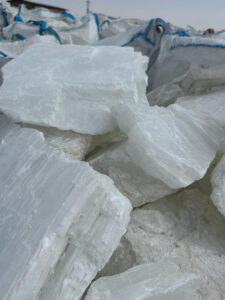A Complete Buyer’s Guide
Gypsum is a natural mineral composed of calcium sulfate dihydrate. It plays a vital role in construction, agriculture, and industrial applications due to its versatility and eco-friendly properties. By understanding the different qualities of gypsum, buyers can select the most effective grade for their projects and industries.

Why Gypsum Is Valuable
Gypsum offers unique advantages that make it indispensable. It provides fire resistance, smooth workability, and soil enhancement. In addition, it is non-toxic, cost-effective, and widely available. Moreover, gypsum improves structural integrity, supports sustainable building practices, and enhances crop yield when used in agriculture.
Key benefits include:
-
Excellent fire resistance and thermal insulation
-
Smooth and easy application for plaster and drywall
-
Soil conditioning and nutrient support in agriculture
-
Multiple grades suitable for varied industrial applications
Different Qualities of Gypsum
1. Construction-Grade Gypsum
Construction-grade gypsum is commonly used in plaster, drywall, ceiling boards, and cement. Its fine texture ensures easy application and a high-quality finish. Furthermore, it strengthens walls and ceilings while meeting fire safety standards. For example, many builders prefer it for both residential and commercial projects.
Key Qualities: Fine particle size, consistent hardness, easy to mold and apply.
2. Agricultural-Grade Gypsum
Agricultural-grade gypsum improves soil structure, reduces erosion, and supplies essential calcium and sulfur. In addition, it enhances nutrient absorption and boosts crop yield. As a result, farmers achieve healthier plants and higher productivity.
Key Qualities: High purity, safe for soil application, effective nutrient supplier.
3. Industrial-Grade Gypsum
Industrial-grade gypsum is used in cement production, plaster, and other manufacturing processes. It controls cement setting times and improves overall durability. Moreover, its consistent chemical composition ensures reliable performance across different industrial applications.
Key Qualities: Stable composition, consistent particle size, enhances material strength.
4. Specialty Gypsum
Specialty gypsum is refined for decorative plaster, moldings, and panels. Its ultra-fine texture allows intricate designs and smooth surfaces. In addition, manufacturers often blend it with additives to improve moisture resistance and strength.
Key Qualities: Ultra-fine particles, customizable properties, ideal for high-end applications.
Choosing the Right Gypsum Quality
When selecting gypsum, consider:
-
Application – construction, agriculture, industrial, or decorative
-
Purity and particle size – higher purity ensures better results
-
Additives or blends – some projects require enhanced properties
By choosing the right grade, businesses maximize efficiency, reduce costs, and achieve durable results.
Commercial Benefits of Gypsum
Companies that invest in the correct gypsum grade gain multiple advantages:
-
Cost-effective – versatile, widely available, and durable
-
Multi-purpose – one mineral serves construction, agriculture, and industry
-
Sustainable – natural, safe, and environmentally friendly

